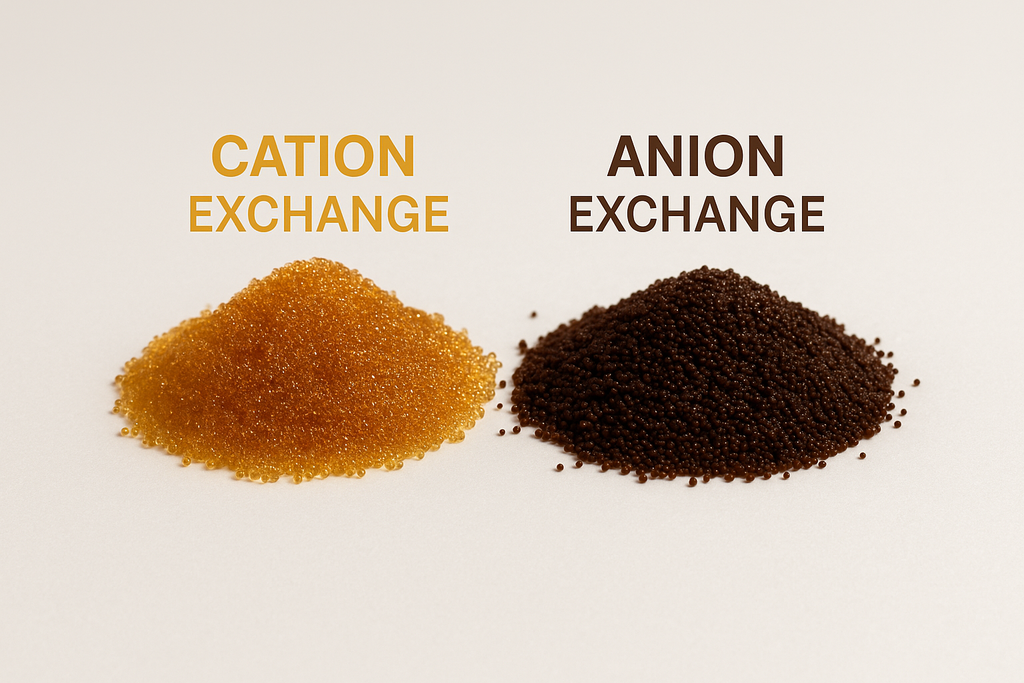Cation vs. Anion Exchange Resins: Key Differences Explained
Cation vs. Anion Exchange Resins: Key Differences Explained When it comes to industrial water treatment, ion exchange resins play a critical role. These synthetic polymer beads remove unwanted dissolv

What is a Cation Exchange Resin?
Cation exchange resins are made of cross-linked polystyrene matrices functionalized with negatively charged sulfonic acid groups. These groups attract and exchange positively charged ions (cations) in the water, such as:
- Calcium (Ca²⁺)
- Magnesium (Mg²⁺)
- Iron (Fe²⁺)
- Sodium (Na⁺)
The resin typically comes in either the hydrogen (H⁺) form or sodium (Na⁺) form, depending on the application.
Example Reaction (Na⁺ form):
2 R–Na + Ca²⁺ → R₂–Ca + 2 Na⁺
This means the resin gives up sodium ions and traps calcium, softening the water.
Common Applications of Cation Resins:
- Water softening (removal of Ca²⁺ and Mg²⁺)
- Boiler feedwater treatment
- Demineralization (with anion resin)
- Metal ion removal in industrial effluents
ASHAION® C 250 H and ASHAION® C 250 Na are our flagship strong acid cation resins, used across industries for high-capacity softening and deionization.
What is an Anion Exchange Resin?
Anion exchange resins are similarly structured, but functionalized with positively charged groups like quaternary ammonium. These resins exchange negatively charged ions (anions) from water such as:
- Chloride (Cl⁻)
- Sulfate (SO₄²⁻)
- Nitrate (NO₃⁻)
- Silica (SiO₂ in colloidal form)
- Bicarbonate (HCO₃⁻)
They’re available in chloride (Cl⁻) or hydroxide (OH⁻) forms.
Example Reaction (Cl⁻ form):
R–Cl + NO₃⁻ → R–NO₃ + Cl⁻
Common Applications of Anion Resins:
- Demineralization and deionization
- Silica and nitrate removal
- Wastewater polishing
- Condensate polishing in power plants
ASHAION® A 100 Cl is our most popular strong base anion resin, designed for excellent regeneration efficiency and high chemical resistance.
Comparison Table: Cation vs. Anion Resins
| Property | Cation Exchange Resin | Anion Exchange Resin |
|---|---|---|
| Target Ions | Positive ions (Ca²⁺, Mg²⁺, Fe²⁺) | Negative ions (Cl⁻, NO₃⁻, SO₄²⁻) |
| Functional Group | Sulfonic acid (-SO₃H) | Quaternary ammonium (-N⁺(CH₃)₃) |
| Forms | Na⁺ or H⁺ | Cl⁻ or OH⁻ |
| Used For | Softening, deionization | Demineralization, polishing |
| Typical Product | ASHAION® C 250 H / Na | ASHAION® A 100 Cl |
What Happens When You Use Both? (Mixed Bed Systems)
When cation and anion resins are combined in a single column, they form a mixed bed resin system — typically used for polishing treated water to ultrapure levels (conductivity < 0.1 μS/cm).
ASHAION® MB Series resins are pre-mixed in ideal ratios and ready to use in electronics, pharma, and laboratory applications.
Regeneration Differences
Both resin types can be regenerated, but with different chemicals:
| Resin Type | Regenerant |
|---|---|
| Cation (Na⁺) | Sodium chloride (common salt) |
| Cation (H⁺) | Sulfuric or hydrochloric acid |
| Anion (Cl⁻ or OH⁻) | Sodium hydroxide (caustic soda) |
Our ASHAION® resins are engineered for high regeneration efficiency, ensuring cost-effectiveness and minimal chemical waste generation over time.
How to Choose the Right Resin Type
Choosing between cation and anion resin depends on:
- Which contaminants are present in the water
- Whether softening or demineralization is the goal
- Availability of regeneration chemicals
- Target water quality and system design
For professional assistance, our team at Asha Resins Limited offers customized resin selection guidance, lab testing, and performance guarantees tailored to your water chemistry and plant setup.
Conclusion
Understanding the difference between cation and anion exchange resins is essential for designing efficient water treatment systems. While cation resins target hardness-causing minerals, anion resins remove undesirable negative ions such as nitrates and chlorides.
When you need dependable, long-lasting, and regenerable resins for industrial use, the ASHAION® range from Asha Resins Limited provides a tested, trusted, and Made-in-India solution for OEMs, EPCs, WTP integrators, and large water users.
Need help choosing the right resin? Contact us today:
🌐 www.asharesins.com/ion-exchange-resins
📧 sales@asharesins.com
📞 +91 70282 00892
75 ltr chahia coll me please 6002253494